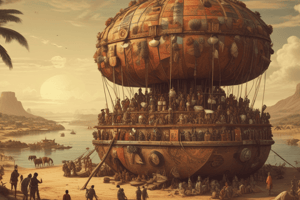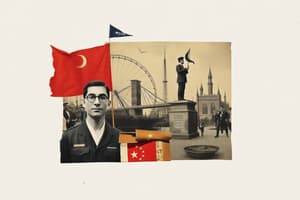Podcast
Questions and Answers
What was a significant result of foreign influence on China at the end of the 19th century?
What was a significant result of foreign influence on China at the end of the 19th century?
- China established stronger military ties with Europe.
- China completely annexed by Japan.
- China became a semi-colony under multiple powers. (correct)
- China retained full sovereignty over its economy.
Which territories did the United States gain as a result of its expansionism beginning in 1898?
Which territories did the United States gain as a result of its expansionism beginning in 1898?
- Cuba and the Philippines
- Cuba and Panama
- Puerto Rico and Hawaii
- Cuba, Puerto Rico, the Philippines, and Hawaii (correct)
What was the Colombian government's response to the U.S. proposal for the Panama Canal?
What was the Colombian government's response to the U.S. proposal for the Panama Canal?
- They approved the construction immediately.
- They proposed a new route for the canal construction.
- They denied the U.S. the right to build the canal. (correct)
- They offered financial support to the U.S.
Which countries were involved in the carving up of China into spheres of influence?
Which countries were involved in the carving up of China into spheres of influence?
Which situation described China at the end of the 19th century?
Which situation described China at the end of the 19th century?
What characterized the African colonies under European powers?
What characterized the African colonies under European powers?
What was one consequence of the colonial economic policy in Africa?
What was one consequence of the colonial economic policy in Africa?
How did the British attempt to 'westernize' India?
How did the British attempt to 'westernize' India?
What characterized the later phase of colonial expansion during the Age of Imperialism?
What characterized the later phase of colonial expansion during the Age of Imperialism?
Which European power established a colony in Eritrea and conquered Libya?
Which European power established a colony in Eritrea and conquered Libya?
Which factor was a major economic cause of imperialism during the late 19th century?
Which factor was a major economic cause of imperialism during the late 19th century?
What was the effect of powerful commercial companies on African trade?
What was the effect of powerful commercial companies on African trade?
What was the significance of Queen Victoria's proclamation in 1876?
What was the significance of Queen Victoria's proclamation in 1876?
What prominent political factor pushed European states to engage in imperialism?
What prominent political factor pushed European states to engage in imperialism?
Which event significantly marked the beginning of the Age of Imperialism?
Which event significantly marked the beginning of the Age of Imperialism?
What was the main reason for replacing mixed small-scale farming in Africa?
What was the main reason for replacing mixed small-scale farming in Africa?
How much of the world's land surface was annexed by European colonial powers between 1870 and 1914?
How much of the world's land surface was annexed by European colonial powers between 1870 and 1914?
Which countries were involved in the colonial division of East Asia during the 19th century?
Which countries were involved in the colonial division of East Asia during the 19th century?
What was one of the main challenges faced by Britain leading up to the Age of Imperialism?
What was one of the main challenges faced by Britain leading up to the Age of Imperialism?
What role did protectionist policies play during the Age of Imperialism?
What role did protectionist policies play during the Age of Imperialism?
Which statement highlights a difference between traditional colonialism and imperialism during the Age of Imperialism?
Which statement highlights a difference between traditional colonialism and imperialism during the Age of Imperialism?
What role did colonial conquests play for the European powers during the late 19th century?
What role did colonial conquests play for the European powers during the late 19th century?
How did nationalism during the late 19th century differ from that inspired by the French Revolution?
How did nationalism during the late 19th century differ from that inspired by the French Revolution?
What was one significant outcome of the Berlin Conference of 1884-1885?
What was one significant outcome of the Berlin Conference of 1884-1885?
Which countries were primarily involved in the colonial powers' competition for Africa by 1914?
Which countries were primarily involved in the colonial powers' competition for Africa by 1914?
What ideology supported the expansionist policies of European powers during the late 19th century?
What ideology supported the expansionist policies of European powers during the late 19th century?
What was the approximate percentage of African territory controlled by European powers by the early 20th century?
What was the approximate percentage of African territory controlled by European powers by the early 20th century?
What initially drove European interest in Africa before the late 19th century?
What initially drove European interest in Africa before the late 19th century?
Which country convened the Berlin Conference that regulated the partitioning of Africa?
Which country convened the Berlin Conference that regulated the partitioning of Africa?
Flashcards
Age of Imperialism
Age of Imperialism
The period between 1870 and 1914, marked by European powers aggressively seeking to control territories worldwide.
Economic Causes of Imperialism
Economic Causes of Imperialism
Gaining access to new markets, cheap resources, and investment opportunities drove European powers to colonize.
Political Causes of Imperialism
Political Causes of Imperialism
European powers sought to increase their global influence and standing, often through competition.
Colonial Control
Colonial Control
Signup and view all the flashcards
Protectionist Policies
Protectionist Policies
Signup and view all the flashcards
Economic Exploitation
Economic Exploitation
Signup and view all the flashcards
Territorial Ambition
Territorial Ambition
Signup and view all the flashcards
Great Powers
Great Powers
Signup and view all the flashcards
European Imperialism in Africa
European Imperialism in Africa
Signup and view all the flashcards
Berlin Conference
Berlin Conference
Signup and view all the flashcards
Colonial race
Colonial race
Signup and view all the flashcards
Nationalism (late 1800s)
Nationalism (late 1800s)
Signup and view all the flashcards
Social Cohesion
Social Cohesion
Signup and view all the flashcards
Expansionism
Expansionism
Signup and view all the flashcards
Colonial Claim
Colonial Claim
Signup and view all the flashcards
19th Century Imperialism
19th Century Imperialism
Signup and view all the flashcards
India's fragmented control
India's fragmented control
Signup and view all the flashcards
China's semi-colony
China's semi-colony
Signup and view all the flashcards
American Pacific Expansion
American Pacific Expansion
Signup and view all the flashcards
Panama Canal Strategy
Panama Canal Strategy
Signup and view all the flashcards
Foreign Pressure on China
Foreign Pressure on China
Signup and view all the flashcards
Colonial Exploitation
Colonial Exploitation
Signup and view all the flashcards
Spheres of Influence
Spheres of Influence
Signup and view all the flashcards
Monoculture Production
Monoculture Production
Signup and view all the flashcards
British Empire India
British Empire India
Signup and view all the flashcards
African Colonies
African Colonies
Signup and view all the flashcards
Sepoy Rebellion
Sepoy Rebellion
Signup and view all the flashcards
Queen Victoria as Empress
Queen Victoria as Empress
Signup and view all the flashcards
Western Imperialism
Western Imperialism
Signup and view all the flashcards
Study Notes
The Age of Imperialism (1870-1914)
- Imperialism refers to a struggle for global control by powerful European nations, prominent between 1870 and 1914.
- Imperialism's roots lie in earlier conquests, beginning in the 16th century and continuing into the first decades of the 19th century.
- A second, more recent phase of colonization, the Age of Imperialism, occurred over several decades, resulting in European power dominating most of the world by 1914.
- During this period, roughly one-fifth of the world's landmass was annexed by European colonial powers.
- The later phase of colonialism involved direct military and political control by European states.
- Earlier forms aimed for economic control through penetration of targeted regions.
- The later colonial struggle focused on controlling entire regions, not just areas for economic exploitation.
Economic Causes of Imperialism
- Colonial territories provided access to new markets and cheap resources.
- Colonial regions were ideal for significant investment.
- Growing protectionist policies in Europe made controlling large territories vital for trade and investment within them.
- The difficult economic period of the Great Depression, beginning in 1873, further incentivized imperialism.
Political and Social Causes of Imperialism
- European powers competed for international standing and influence.
- Britain's dominance faced threats from other powers.
- France, Germany, Japan, and other colonial powers aimed to consolidate their emerging industrial economies.
- Imperial expansion benefited powerful industrial groups, ruling classes, and the military elite.
- Social cohesion in Europe was promoted through colonial conquests focused on shifting the attention away from domestic conflicts.
Ideological and Cultural Features
- Imperialism was intertwined with nationalist and racist ideas of the 19th century.
- Feelings of cultural and racial superiority fueled expansionist policies.
- Powerful societies had a perceived right to conquer and control weaker ones.
European Presence in Africa
- By the late 19th century, European powers were rapidly establishing colonies across Africa and Asia.
- European control in Africa was initially limited, with only about 10% of the continent under European territory.
- By the early 20th century, nearly 90% of Africa was controlled by European powers.
- The Berlin Conference of 1884-1885 formalized European claims to African territories.
- Africa was divided into spheres of influence by European powers.
Colonial Rule in Africa
- Unlike settlement colonies(e.g., the Americas or Australia) which were settled, African colonies focused on resource exploitation.
- A limited number of European colonists administered the majority of the region.
- Control was exerted over natural resources to benefit the home country.
India and East Asia
- India was a major area of British imperial expansion in the 18-19th centuries.
- This region was carved up between existing and emerging colonial powers, including the United States, Japan, and others.
- Similar patterns of resource exploitation were also observed in the East Asian regions.
British India (Map)
- India's population was a key factor driving British interest in the region.
- The British East India company played a crucial role in establishing the British presence, taking over direct control after the Sepoy Rebellion of 1858.
- Queen Victoria was declared Empress of India in 1876.
China Under Foreign Pressure
- China was a target for expansion during the 19th century, with various European nations trying to carve up economic spheres of influence.
- China was not fully colonized but rather transformed into a "semi-colony" due to economic concessions to multiple foreign powers.
American Expansionism
- The United States expanded in the Pacific and Central Americas beginning in the end of the 19th century.
- The U.S. gained territories like Puerto Rico, the Philippines, and Hawaii.
- The U.S. was actively involved in building a global naval and military presence.
- The U.S. built the Panama Canal to facilitate trade between the Pacific and Atlantic Oceans.
Studying That Suits You
Use AI to generate personalized quizzes and flashcards to suit your learning preferences.




